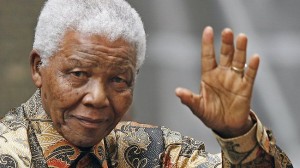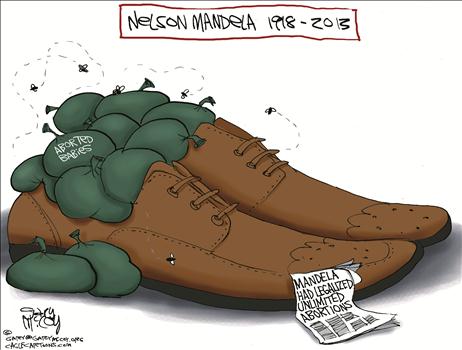I want to make a few statements right up front today before delving into my topic. First, my intent in this post is not to be arbitrarily contrary or mean-spirited; I always want to write with grace toward a subject whenever possible. Second, as a Christian, I absolutely oppose any policy that divides people by race or that promotes racial superiority. Third, I rejoice whenever a regime built on racial inequality is dismantled.
Why did I think it necessary to make those statements at the start? Well, it’s because I’m not going to be jumping on the world’s bandwagon today in undiluted praise for the life of Nelson Mandela.
 I understand the horrible circumstances into which Mandela was born in South Africa. Further, I “get it” that someone in those circumstances would find it easy to attach himself to a movement that sought to wreck the system that created apartheid. I also know, especially after my in-depth study of people like Whittaker Chambers, how communism would seem to be the salvation of people trapped in that system. However, I also know the false hope it offers and how it leads its followers into unspeakable atrocities no better than the oppression it wants to overthrow.
I understand the horrible circumstances into which Mandela was born in South Africa. Further, I “get it” that someone in those circumstances would find it easy to attach himself to a movement that sought to wreck the system that created apartheid. I also know, especially after my in-depth study of people like Whittaker Chambers, how communism would seem to be the salvation of people trapped in that system. However, I also know the false hope it offers and how it leads its followers into unspeakable atrocities no better than the oppression it wants to overthrow.
Nelson Mandela, in his youth, committed himself to the communist philosophy, but it wasn’t just an intellectual exercise. He actively carried out and/or approved brutal murders in the name of liberation. The African National Congress (ANC) was an effective tool of the Soviet Union to spread the communist vision into South Africa. Keep in mind that, in the name of communism, untold millions have been slaughtered. It has been a pure evil in this world.
Mandela was imprisoned for twenty-seven years for those activities, and no matter how wrong the apartheid policies were, what he sought to replace them with was no better. As I understand it, he was offered release from prison many times if he would only renounce his terrorist actions; he refused.
I’ve tried to read as much about him in the past few days as I could, seeking to find some glimmer of light that would make me feel comfortable with his later life and accomplishments. I’ve particularly been drawn to Christian writers who have tried to provide a Biblical perspective on the man. Yet even those whom I respect seem to fall into line with the near-hero-worship attitude. One even tried to equate Mandela’s actions with George Washington, saying that one man’s terrorist is another man’s freedom fighter.
It’s become fashionable to use Washington and the other Founders of America as examples of terrorists from the British point of view. As an American historian, I can say unconditionally that comparison is askew. There were no mass murders in the American Revolution; the colonists had been self-governing for decades, only to see that taken away; the fighting broke out as a matter of self-defense; there were rules of warfare acknowledged on both sides that kept atrocities to a minimum; the goal was simply the reestablishment of self-government; the inspiration for the majority was Christian faith.
In all my reading about Mandela, I sought to discover if he really changed and became a Christian. The writers all pointed to his lack of retribution toward others when he eventually was elected to lead the government. I certainly applaud that. They talk about his sweet temperament and lack of resentment after being released from prison. Those are usually good indicators of a heart change. I hope Mandela found peace with God through Christ, since that is the only way for peace with God to be achieved.
Yet none of those writers, some of whom strove mightily to claim he was a Christian, could point to any definitive salvation experience or any statement directly from him that revealed his Christian faith. It was all rather vague: if he could lay aside revenge, he must have become a Christian. That’s not enough for me.
Mandela never renounced his admiration for people like Fidel Castro. He never changed his mind about the United States being the most oppressive nation in the world. And as president of South Africa, I learned he signed into law the most permissive abortion policy the world has ever seen. Would a genuine Christian do that?
My reading also uncovered the current state of South Africa post-Mandela: poverty still abounds; murder and rape are at an all-time high, statistics showing that country leading the world in those crimes. And then there’s the abortion policy already mentioned. Is this the utopia we’re supposed to be grateful for? Is this some kind of great improvement on the past?
So please forgive me if I’m not particularly thrilled to commemorate the life and accomplishments of Nelson Mandela. I want to be open to further information about him that would put him in a better light, but what I’ve learned thus far has not convinced me that he is—as one commentator declared—the greatest man in history.

